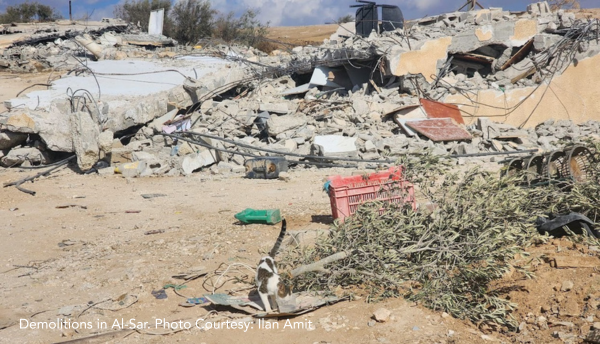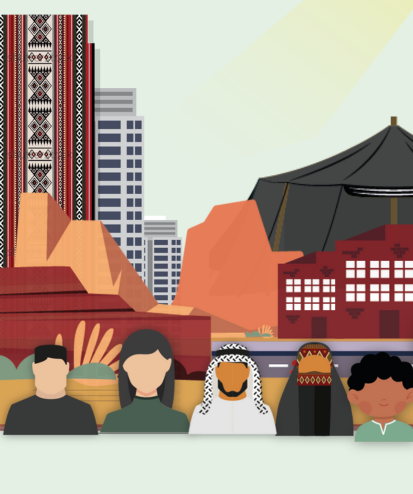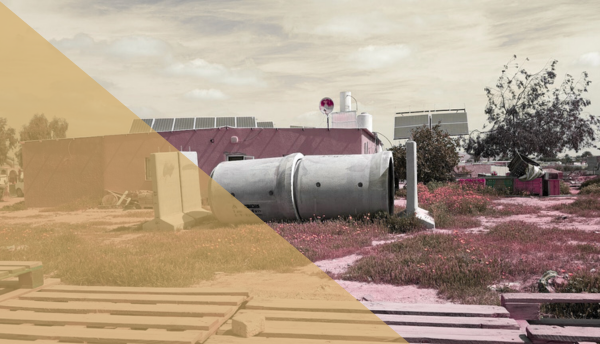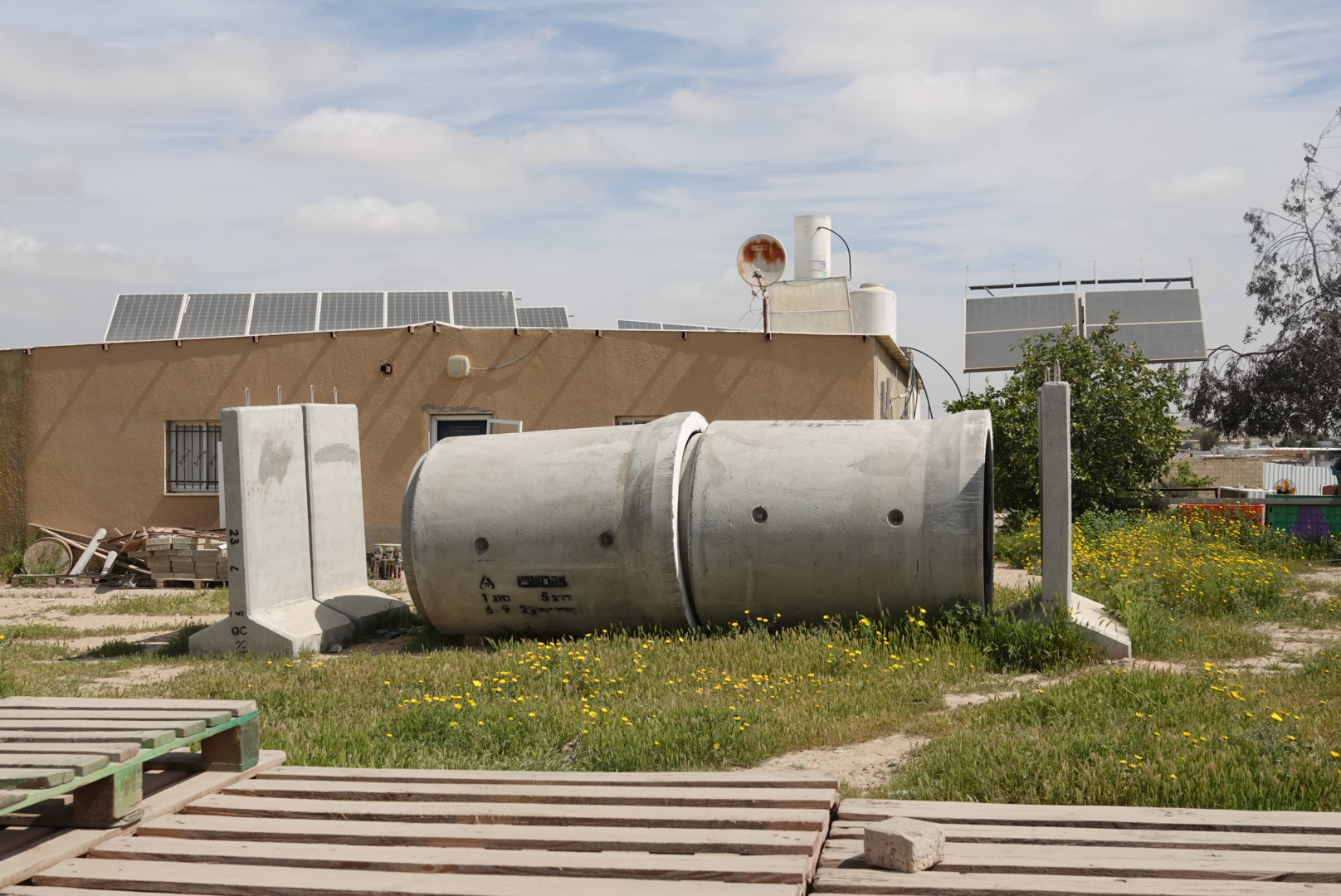Demolitions, Pilot Zoning Plan for Bedouin Communities Met with Protests
In May and June, enforcement of demolition orders and approval of a new pilot plan to regulate Bedouin settlement in the Negev generated renewed concerns about the status of state-minority relations in the Negev.
On May 25, 2025, the Ministerial Committee on Bedouin Sector Affairs at the Prime Minister’s Office, approved a Mikudim (Zoning) pilot-plan to regulate Bedouin settlement in the Negev. The regulation is part of the broader “Zoning Plan” approved in June 2023 (GR-704), which aims “to develop long-term solutions for the unrecognized Bedouin communities and strengthen regulated settlement in the Negev.”
The launch of the pilot plan comes amid a wave of home demolitions in unrecognized Bedouin villages. Recent demolitions of Al-Sar and other unrecognized villages prompted a 5000 thousand-person non-violent protest on June 29 along Reger Road in Be’er Sheva, as hundreds of families were left homeless during a time of crisis. Between January and November 2024, there was , there was a 400% increase in the enforcement of demolition orders, and more planned for 2025.
The plan has increased concerns from leadership and civil society organizations who argue that it was developed without meaningful consultation with Bedouin community leadership and fails to account for cultural and local realities, particularly during a time of national emergency. Along with demolitions, Bedouin communities are also concerned that demolition efforts will proceed without ensuring that alternate housing solutions are available.
Background: Negev Bedouin Communities
Approximately 300,000 Bedouins reside in the Negev. Since 1969, the state has established seven towns, recognized 12 villages, and launched several plans to resettle unrecognized communities. Many Bedouins, however, have resisted relocation, claiming historic land rights and unwilling to give up traditional lifestyles for urban ones.
Today, 25–40% of Negev Bedouins live in 35 unrecognized villages without legal status, planning approval, or basic infrastructure. The land disputes cover about 4.9% of the Negev (around 640,000 dunams), including 2.7% (350,000 dunams) where the unrecognized villages are located. Some claims also overlap with land in state-recognized Bedouin towns. As of 2017, approximately 43% of the land in recognized Bedouin localities was still under ownership dispute, according to the Ministry of Justice.
These disputes center on claims by Bedouin residents of the Negev, who seek recognition of traditional ownership of lands passed down through generations. From the Bedouin perspective, these are historical rights that were never formally acknowledged; from the state’s perspective, most of the disputed areas are considered public land, as Israeli property law doesn’t recognize the Bedouin ownership claims that are often not supported by required documentation. The dispute has been one of the most sensitive issues in state-Bedouin relations over the years.
Plan Rational and Key Propositions
The pilot Zoning plan was formulated by the Authority for the Development and Settlement of the Bedouin in the Negev (the Authority) under the Ministry for Diaspora Affairs and Combating Antisemitism, headed by Minister Amichai Chikli, in collaboration with various government ministries. According to the introductory narrative of the draft law, the government sees development of the Negev as one of the most important national tasks. It notes that past efforts by the Authority to reach compromises, including the Prawer-Begin Plan, have yielded limited results, as more than 70% of the land remains undeveloped due to unresolved claims, stalling plans for housing, commerce, and public infrastructure.
The plan combines incentives for cooperation with legal enforcement. Under this arrangement, claimants can receive financial compensation and partial recognition in exchange for relinquishing their land claims, according to terms set by the state. However, those who do not reach an agreement within the designated time frame will have their claims removed from official development plannings. In such cases, the state may also initiate legal expropriation procedures.
The pilot phase is set to begin in five state-recognized localities: Kseifa, Mar’it, Sa’wa (Mulada in Arabic), Abu Talul, and Laqiya with the purpose of expanding the boundaries of these municipalities to incorporate the surrounding unrecognized village, in line with the approach outlined in Government Resolution 704.
In these communities, residents who accept the state’s terms may receive financial compensation and partial recognition for land claims. In practice, this means that if no deal is reached, municipal boundaries (“blue lines”) will be redrawn, and any disputed land left outside those borders will be declared ineligible for development by the claimant.
As part of the process, Bedouins who reach agreements with the state will be temporarily relocated into caravans on state-allocated land within recognized towns. The temporary relocation is limited to five years, though the plan includes no obligation for authorities to develop permanent infrastructure within that timeframe.
Protests Against Demolitions and the Plan
The launch of the pilot plan comes amid a wave of home demolitions in unrecognized Bedouin villages. The demolitions in two residential areas of Al-Sar village happened ahead of the holiday Eid al-Adha resulting in about 170 displaced residents forced to seek temporary shelter in a community center and school in nearby Segev Shalom Council.
The Israel Land Authority stated that the demolitions in Al-Sar followed a court ruling affirming the state’s claim that residents had agreed in a 2023 settlement to vacate the area. According to the Authority, Al-Sar was evacuated to build 300 regulated housing units in Segev Shalom, but construction has yet to begin, leaving the displaced Bedouin citizens in limbo during the national emergency as the war with Iran was progressing.
Following the demolitions, over 5,000 people from all corners of the country joined in Beer Sheva near the Bedouin Settlement Regulatory Authority in protest. They carried signs such as “A home is a basic right of every person.” Rahat Mayor and Chair of the Bedouin Municipal Council in the Negev, Talal al-Karnawi, called for a peaceful demonstration: “We will raise a clear voice against home demolitions. Yes to dignity, yes to life—no to demolition.”
According to the Council for Unrecognized Villages, since May, 264 residential structures have been demolished, in addition to other buildings in the villages of Wadi al-Khalil, Umm Mitnan, and Umm al-Hiran.
Bedouin Community Perspectives
When Knesset discussions of the plan were held in March this year, Rahat Mayor Talal Alkernawi stated: “For two or three weeks after October 7, we felt like the ‘good Bedouins’ because we stood up for the Negev and for our fellow citizens. Then we were once again labeled as robbers, thieves, and illegal builders.<…> This matter must be taken seriously if we are to truly address it.”
Several MKs are concerned that the government’s plan imposes a one-size-fits-all urban model on Bedouin communities, disregarding their agricultural lifestyle, historical connection to the land, and basic infrastructure needs. They argue that without proper recognition of Bedouin land rights and meaningful investment in services, the plan deepens inequality and mistrust. MK Yousef Atawna: “We are asking for equality in planning. A solution is being forced on Bedouin society, when in reality, the form of settlement should be as diverse and flexible as it is for every Jewish citizen in the Negev. Just as a Jew is allowed to live on a kibbutz, a moshav, or in a village, you cannot impose a single model of settlement on the Bedouins.”
Heads of local councils and authorities warn that they lack coordination capacities and resources to absorb temporary residents from unrecognized villages, and that the caravan housing plan lacks clear guidelines or timelines. “This could lead to severe overcrowding and traffic congestion at the town’s entrance and exit,” a representative from Segev Shalom council notes. Another concern is the lack of adequate funding for the anticipated population growth. “The plan does not guarantee budgets for basic services like kindergartens or welfare,” they explain. “We are a small council with limited resources—we cannot operate at a deficit. <…> this must be done in coordination, with mutual agreement, and accompanied by appropriate budgets.”
Civil society professionals are concerned that the large-scale demolitions and the implementation of the plan will deepen existing socio-economic disparities, which will have long-term consequences for Jewish-Arab relations in the Negev.
AJEEC-NISPED, a Negev-based Jewish-Arab NGO , warned that the timing and nature of the plan are especially problematic: “The decision comes at one of the most critical moments of crisis for Bedouin society. <…> The economic crisis that Bedouin society has faced since the outbreak of war is unprecedented—employment in agriculture, hospitality, and construction halted overnight, striking a severe blow to the poorest population in Israel.” “This resolution meets Bedouin society at a moment when it needs assistance and support in employment and education, rather than a confrontation marked by a wave of home demolitions and evictions.”
How Can We Help?
Do you need support integrating these resources and issues into your philanthropic, communal, or Israel education work? Reach out for consultations, connections to experts, program support, training, or to plan your next event or mission. If you’ve used our resources, tell us about your experience!




